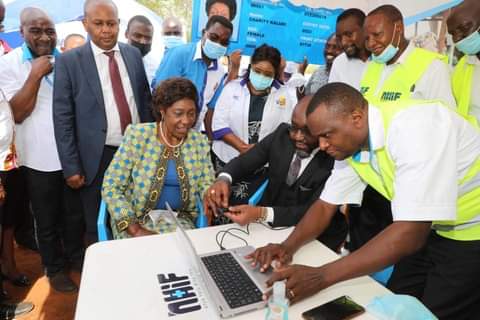Kenya and the Kingdom of Thailand have signed a memorandum of understanding (MOU) in capacity building, research, health financing and health technology assessment program towards the achievement of Universal Health Coverage (UHC).
The signing was done by Health Cabinet Secretary (CS), Sicily Kariuki on behalf the Kenyan government while Thai Minister of Public Health, Prof. Emeritus Piyasakol Sakolsatayadorn represented his government in a ceremony held at a Nairobi hotel on Thursday.
Speaking at the Ceremony, Kariuki said some of the areas Kenya will benefit from include Health Technology Assessment (HTA), UHC and capacity building in human resource management besides scholarships for short courses and Master’s Degree in Thailand.
She said Kenya has many lessons to learn from Thailand kingdom who have successfully implemented UHC for her citizens.
The CS said that the signing is a culmination of a visit by a team from her ministry that she led to Thailand in January this year, after a meeting held in Nairobi in May 2018 with her counterpart in Thailand, where an understanding was reached for Thailand to help Kenya in capacity building towards UHC.
Kariuki further noted that the ongoing National Hospital Insurance Fund (NHIF) reforms were aimed at streamlining and making the insurance more responsive, similar to Thailand’s National Health Security Office (NHSO), which has successfully managed public health in Thailand for years.
“The pilot phase of UHC in the four counties of Nyeri, Kisumu, Machakos and Isiolo started three months ago and has reported positive feedbacks with Kenyans, saying there is continuous availability of medicines and committed care givers,” added Kariuki.
The CS revealed that 50 technical officers from her ministry and related departments have been trained by a team from Thailand in the last three days, noting that the training will be continuous as specified in the MOU.
She announced that UHC will be rolled-out to all the 47 Counties by 2022 with the support of Thailand.
On his part, Prof. Sakolsatayadorn said his country’s public health success story is attributed to medical staff commitment to offer quality service to citizens than quest for money.
“In Thailand we have a team of medical professionals solely dedicated to public health service working in the rural areas and we support and appreciate them by giving them financial incentives,” said Piyasakol
“We have also invested heavily in training manpower in the medical sector, a move that has seen the number of doctors graduating increase by between 1000 to 3000,” added Piyasakol.
He said focus on rural areas on infrastructure and medical supplies, has enabled people to access medication near their localities rather than travel to urban centres.
“Our journey of 50 years in the medical field has not been easy and I believe Kenya’s will be shorter as there is political goodwill which is very important for UHC to succeed,” Piyasakol said.
By Simon Githogori



